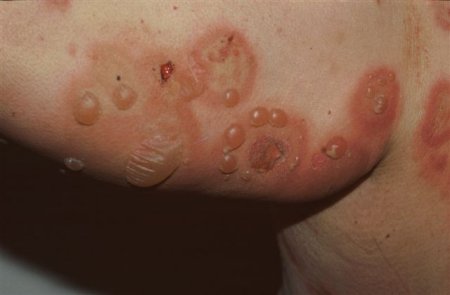Resumo
Definição
História e exame físico
Principais fatores diagnósticos
- pruritus
- tense blisters on normal or erythematous skin
Outros fatores diagnósticos
- erythematous or urticarial plaques
- oral lesions
Fatores de risco
- age 60 to 90 years
- major histocompatibility complex (MHC) class II allele (DQB1*0301)
- male sex
Investigações diagnósticas
Primeiras investigações a serem solicitadas
- skin biopsy for histopathologic evaluation with light microscopy
- skin biopsy for direct immunofluorescence testing
- indirect immunofluorescence test on serum
Investigações a serem consideradas
- ELISA test
Novos exames
- immunoblotting
- immunoprecipitation
- fluorescence overlay antigen mapping (FOAM) technique
Algoritmo de tratamento
localized lesions in children or adults
widespread lesions in adults
widespread lesions in children
Colaboradores
Autores
Vesna Petronic-Rosic, MD, MSc, MBA
Professor and Chair
Department of Dermatology
Georgetown University
MedStar Washington Hospital Center
Washington
DC
Declarações
VPR declares that she has no competing interests.
Revisores
Lawrence Parish, MD
Clinical Professor of Dermatology and Cutaneous Biology
Director
Jefferson Center for International Dermatology
Jefferson Medical College
Thomas Jefferson University
Philadelphia
PA
Declarações
LP declares that he has no competing interests.
Timothy Patton, MD
Assistant Professor of Dermatology
Department of Dermatology
University of Pittsburgh
Pittsburgh
PA
Declarações
TP declares that he has no competing interests.
Créditos aos pareceristas
Os tópicos do BMJ Best Practice são constantemente atualizados, seguindo os desenvolvimentos das evidências e das diretrizes. Os pareceristas aqui listados revisaram o conteúdo pelo menos uma vez durante a história do tópico.
Declarações
As afiliações e declarações dos pareceristas referem--se ao momento da revisão.
Referências
Principais artigos
Cotell S, Robinson ND, Chan LS. Autoimmune blistering skin diseases. Am J Emerg Med. 2000;18:288-299. Resumo
Kirtschig G, Middleton P, Bennett C, et al. Interventions for bullous pemphigoid. Cochrane Database Syst Rev. 2010;(10):CD002292.Texto completo Resumo
Kirtschig G, Khumalo NP. Management of bullous pemphigoid: recommendations for immunomodulatory treatments. Am J Clin Dermatol. 2004;5:319-26. Resumo
Artigos de referência
Uma lista completa das fontes referenciadas neste tópico está disponível para os usuários com acesso total ao BMJ Best Practice.

Diagnósticos diferenciais
- Pemphigus vulgaris
- Epidermolysis bullosa acquisita
- Linear IgA dermatosis
Mais Diagnósticos diferenciaisDiretrizes
- Guidelines for the management of bullous pemphigoid
Mais DiretrizesCalculadoras
Karnofsky Performance Status Score
Mais CalculadorasConectar-se ou assinar para acessar todo o BMJ Best Practice
O uso deste conteúdo está sujeito ao nosso aviso legal